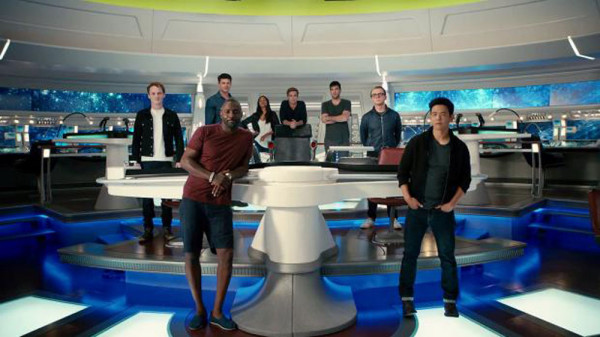JJ Abrams’ 2009 Star Trek reboot stands up as one of the best blockbusters of the past decade.
In cleverly establishing an alternate timeline, it paved the way for a raft of other part-sequel, part-remake, part-reboots – very few of which have managed to pull off the trick as successfully (hi, Terminator Genisys).
Abrams’ 2013 follow-up, Star Trek Into Darkness, consolidated the brilliant set-up with an enigmatic villain and some fantastic character work between the crew – particularly between Kirk and Spock – even if the ‘secrecy’ over Cumberbatch’s role as Khan was something of a marketing misstep.
But Abrams has since gone off to help reinvigorate another space-faring franchise, and so director Justin Lin – best known for the Fast & Furious franchise – steps in to take the helm for Star Trek Beyond. And for better or worse, it feels very much like a Justin Lin film.
The plot sees Kirk growing weary of space travel after almost three years, until the Enterprise finds itself responding to a distress call from inside a mysterious nebula. Inevitably, it’s a trap, and the crew find themselves split up and stranded on an alien planet, plagued by the nefarious Krall (Idris Elba, under heavy make-up), who’s chasing a MacGuffin that will allow him to destroy the shiny new Federation space-station of Yorktown (Hamilton fans, that one’s for you.)
The splitting up of the principal cast has mixed results. The highlights come with Bones and Spock’s interplay, with Karl Urban’s sarcastic, world-weary doctor and Zachary Quinto’s logical and stoic half-Vulcan making for a hugely entertaining double-act.
The film certainly suffers from keeping Kirk and Spock apart – they are by quite some distance the franchise’s best characters, and their relationship the most interesting – but the Bones/Spock show does at least take the edge off.
The rest of the cast, sadly, continue to be largely underutilised. Splitting the group could’ve given the rest of the crew some real focus while they’re outside of Kirk’s shadow, but John Cho’s Sulu and the late Anton Yelchin’s Chekov remain fairly thin background figures. Even Zoe Saldana’s Uhura feels underused.
Perhaps it’s not surprising that Simon Pegg – also on writing duties – has the best of it, as Scotty makes friends with an alien warrior named Jaylah (Sofia Boutella): far and away the best of the film’s newcomers.
As energetic and punchy as the film is, much of it also feels undercooked. Idris Elba growls adequately as the villain, but Krall’s motivation never really convinces, while the nature of the MacGuffin and its powers is never clear.
As for the action, the film’s opening set piece is spectacular; on such a scale that it feels like a climax. It’s so good you’ll wonder how the film is ever going to top it going forward (it can’t). But much of the rest is choppy and muddled; the editing making it tricky to keep track of exactly what’s going on. The fast cut, punchy style works well in the recognisable world of F&F, but is less suited here.
It’s also difficult not to feel that much of the production design appears to be borrowed from other media, with a new swarm-like alien fleet being lifted from Ender’s Game, while the design of Yorktown could generously be said to have been ‘inspired’ by the Citadel from the Mass Effect videogames.
The more Justin Lin the film gets, the weaker it gets. A particular plot device – likely to be extremely divisive – is the sort of enjoyable flourish that makes the Fast & Furious films so much fun, but it sits awkwardly in a Star Trek film. It may illicit wry smiles, but it also completely pulls you out of the moment.
Similarly, Kirk turning into James Dean and pulling motorcycle stunts doesn’t feel right either. For all that the set-up is classic Trek, all too often Star Trek Beyond doesn’t actually feel all that much like a Star Trek film. For some, that’ll be a boon. For others, it’s disappointing.
Nevertheless, Star Trek Beyond is entertaining enough, albeit slightly overlong, with interest beginning to wane towards the end. A knowing line early in the film has Kirk complaining that his life has become “too episodic”. Using that analogy, Star Trek Beyond has both the strengths and weaknesses of a standalone episode.
It gets to cut loose and have some fun, but it also lacks any of the emotional heft of an arc episode, while the villain pales in comparison to Cumberbatch’s Khan. It’s lightweight, throwaway stuff.
Michael Giacchino’s score is still iconic, and the ensemble remains superbly cast and hugely watchable, but while it never comes close to being outright bad, Star Trek Beyond doesn’t hold a candle to what came before.
Released in UK cinemas on Friday 22 July 2016.
> Follow Alex Mullane on Twitter.
What did you think of the movie? Let us know below…

